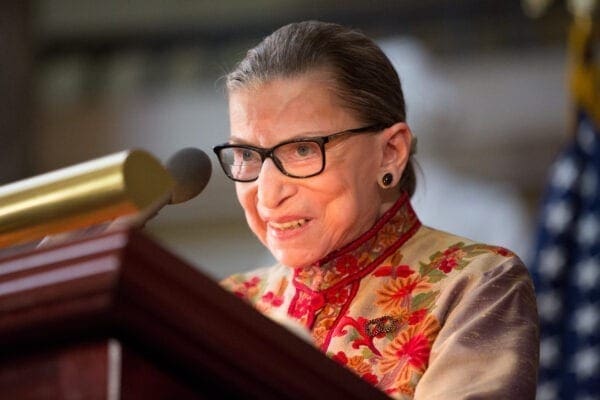Friday night, while I was eating supper with the family, my bestie sent a text that read, “RBG just died, man.”
I sat there staring at the notification, numb. My stomach twisted. A huge lump formed in my throat. I pushed my plate away because I knew I wouldn’t be able to keep down another bite.
Ruth Bader Ginsburg was dead, and, in that moment, so were the hopes of millions of women. I sat there, silent, listening to the notifications on my phone. It took everything I had to look at my daughters. My youngest asked what was wrong, and I looked at my oldest as I said, “RBG died.” The oldest gasped and said, “Mama…”
I had nothing to give her other than a “yeah.” We sat there, silent, with tears in our eyes, staring at each other. I didn’t know what to say. I picked up my phone and began reading through my texts. Most, to be quite honest, were one-word curses because that was all that was needed; women didn’t need to say much more to each other.
It hit me, as I came across a meme that said if you can own a house without a man’s name on it, if you can have your own bank account, if you can have your own credit card without a man’s name on it, then you need to honor her. My mind immediately went back to one evening last summer when I was doing some research on West Virginia women. I had stumbled across some stories of coal miner’s wives recorded when West Virginia miners began joining the union. One story impressed me so much that I woke up my girls so they could listen to it.
Wives with Guns
The story was about how the wives of the miners went to great lengths to protect the livelihood of their families, even while forced to live in tents near the mines after being removed from the coal camps. The woman said that she had rifles on each leg under her skirt and an apron full of bullets. She and other women from the camp would lay in wait for the trains to come which delivered the replacement workers. As the trains pulled in, the women would begin firing bullets at them so the men would not leave the train to take their husbands’ jobs. Women also told stories of working with their daughters to pull the train tracks up by hand to prevent the travelers from entering the mines and taking their husband’s jobs.
“That’s what West Virginia women do,” I exclaimed to my sleepy daughters. “That’s the kind of fight that’s in our DNA!”
In 1911, Hallie James, from Marshall County, was a school teacher. Nineteen days after being re-appointed as a music teacher, Ms. James married. When the local school board was made aware of her marriage, she, then Hallie James Jameson, was no longer allowed to teach in the school system because married teachers were not allowed.
Mrs. Jameson refused to comply with the order and reported to the schools every day where she would be told by the principals that she was not allowed to enter the classroom. She spent the school year sitting in hallways. Eventually, she sued the school board for wages owed her, and the case made its way to the W.Va. Supreme Court of Appeals. Though she was never paid back wages, she did establish the precedent that marriage was no longer a reason for a teacher to not be allowed to do so. (You can read these stories and more on the WV Department of Arts, Culture and History.)
Blazed the Trails
I fell asleep last night with a book about Fannie Lou Hamer in my hands. Her story is another powerful example of a woman who risked her life to fight for equality and civil rights. In fact, I can make a seemingly endless list of women who have sacrificed absolutely everything to fight for equality and equal rights. Sure, RBG was a household name and rightfully so, but we women don’t need to look outside of our state, our communities, or even our own families to find examples of determined and unshakable women; it’s in our DNA.
We need to take time to mourn our nation’s loss, but we cannot mourn for one minute and sit on our asses the next. The best way to honor the memory of those women who blazed the trails for us, our ancestors, is to pick up the cross and keep moving forward. We have to. Because I want to be able to look my daughters in the eye when this election is over.
Call your friends and family and make sure they vote. Donate time to campaigns that share your values.
Onward,
Amy Jo


